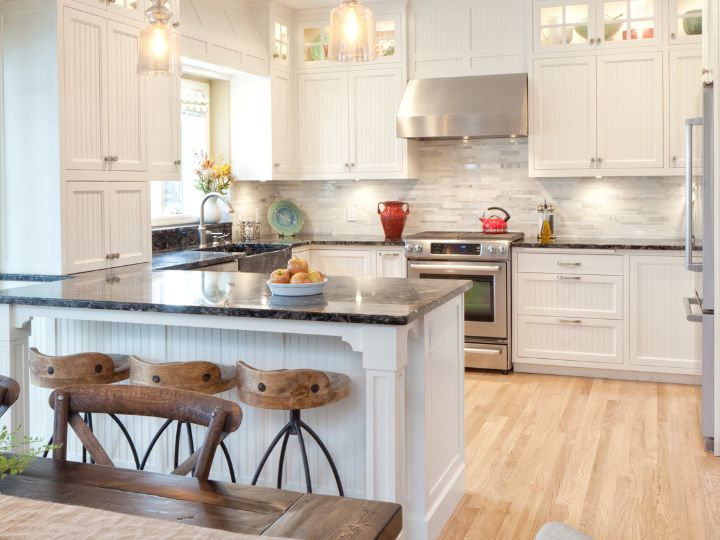
Navigating Grand Rapids Basement Permit Requirements

When planning a basement renovation or finishing project in Grand Rapids, securing the proper permits is an essential step. While transforming an underutilized basement into a functional living space can increase your home's value and expand your usable square footage, it’s important to ensure the project complies with local building codes and regulations.
Navigating Grand Rapids basement permit requirements may seem like a daunting task at first, but understanding the steps and regulations involved will make the process smoother and prevent costly delays. This guide will break down everything you need to know about basement permit requirements in Grand Rapids, including when a permit is needed, how to apply for one, and common issues homeowners face during the process.
Key Takeaways:
- Permits are required for most major basement renovations in Grand Rapids, including electrical, plumbing, and structural work.
- Failing to obtain the necessary permits can lead to fines, delays, and even having to undo completed work.
- Understanding local building codes and regulations is crucial to ensure your basement renovation is safe and up to code.
- The permit application process involves submitting detailed plans, inspections, and obtaining final approval from the city.
- Working with a licensed contractor who understands Grand Rapids basement permit requirements can simplify the process.
When Do You Need a Permit for a Basement Project?
The first step in navigating the permit process is understanding when a permit is necessary. In Grand Rapids, a building permit is generally required for any work that affects the structure or systems of your home. This includes basement renovations such as:
- Electrical work: Installing or updating wiring, outlets, lighting, or electrical panels.
- Plumbing work: Adding or modifying plumbing for a bathroom, laundry room, or wet bar.
- Structural changes: Removing or adding walls, installing egress windows, or reinforcing the foundation.
- HVAC installations: Installing or modifying heating, ventilation, or air conditioning systems.
- Insulation and drywall: Significant changes to insulation or finishing drywall for habitable spaces.
Minor cosmetic changes, such as painting or installing flooring, typically do not require a permit. However, it’s always a good idea to consult with the city’s building department or your contractor to confirm whether a permit is required for your specific project.
The Importance of Obtaining Permits
Securing the necessary permits for your basement project in Grand Rapids is not just a bureaucratic formality. It plays a crucial role in ensuring that your renovation is safe, compliant with local building codes, and completed to the highest standards. Here’s why obtaining the correct permits is essential:
1. Ensures Safety and Compliance
Building codes exist to protect homeowners and occupants by ensuring that construction work meets safety standards. Permits ensure that electrical wiring, plumbing, and structural modifications are performed correctly, reducing the risk of fire, water damage, and structural failure.
2. Avoids Fines and Penalties
Undertaking a basement renovation without the required permits can lead to fines, penalties, and enforcement actions from the city. In some cases, the city may require you to undo the completed work and start over, which can be costly and time-consuming.
3. Protects Property Value
If you decide to sell your home in the future, potential buyers or their inspectors will likely inquire about the permits for any major renovations. Unpermitted work can decrease your home’s value, make it harder to sell, or lead to legal disputes during the sale process.
4. Necessary for Insurance Coverage
If an unpermitted renovation results in damage or an accident, your homeowner’s insurance may refuse to cover the costs. Proper permits ensure that your insurance remains valid and that you are protected in case of an issue.

Steps to Navigating the Grand Rapids Basement Permit Process
Now that you understand the importance of securing permits, let’s dive into the process itself. Navigating the Grand Rapids basement permit requirements involves several steps, from preparing plans to inspections and final approval. Here’s a breakdown of each stage:
1. Determine the Scope of Your Project
Before applying for a permit, clearly define the scope of your basement renovation. What work will be done, and how extensive is the project? For example, if you’re simply finishing your basement with new flooring and paint, a permit may not be necessary. However, if you’re adding a bathroom or performing electrical work, you’ll need to secure the proper permits.
The more detailed your project scope, the easier it will be to navigate the permit process. It’s essential to outline any electrical, plumbing, HVAC, or structural changes you plan to make.
2. Research Local Building Codes
Grand Rapids has specific building codes and zoning requirements that apply to basement renovations. It’s important to familiarize yourself with these codes to ensure your project complies with local regulations. Some key considerations include:
- Ceiling height: Finished basements must have a minimum ceiling height of 7 feet in most areas.
- Egress windows: If you’re converting your basement into a bedroom or living space, you may be required to install an egress window for emergency exits.
- Fire safety: Building codes may require fire-rated materials for certain walls, ceilings, and doors.
Researching these regulations in advance will help you avoid surprises during the permit process.
3. Submit Detailed Plans
Once you’ve defined your project scope and researched the necessary codes, the next step is to submit detailed plans to the Grand Rapids Building Department. These plans should include:
- Floor plans: A layout of the basement, including existing structures and any new additions (e.g., walls, plumbing, electrical).
- Mechanical plans: Information on HVAC systems, electrical wiring, and plumbing installations.
- Structural changes: If you’re making structural modifications, you’ll need to provide details on how the changes will be made and ensure they comply with local codes.
If you’re working with a licensed contractor, they can help prepare these plans and submit them on your behalf.
4. Pay the Permit Fees
There are fees associated with obtaining a basement renovation permit in Grand Rapids. These fees vary based on the scope and complexity of the project. For example, a basic electrical permit may cost less than a comprehensive renovation that involves multiple systems.
The fees typically cover the cost of plan reviews and inspections by city officials. Make sure to budget for these costs when planning your renovation.
5. Schedule Inspections
As your basement project progresses, the Grand Rapids Building Department will require inspections to ensure the work complies with building codes. These inspections occur at various stages of the project, including:
- Rough-in inspection: This occurs after electrical, plumbing, and HVAC systems have been installed but before walls are closed up.
- Framing inspection: Ensures that any structural changes are compliant with codes.
- Final inspection: Once the project is complete, a final inspection is conducted to verify that everything has been done correctly and is up to code.
Passing these inspections is necessary to receive final approval for your project.
6. Obtain Final Approval
After passing all required inspections, the city will issue a certificate of completion or final approval. This document confirms that your basement renovation complies with Grand Rapids building codes and is safe for use.
Be sure to keep this documentation for your records, as it may be required if you sell your home or need to provide proof of permitted work to your insurance company.

Common Challenges with Basement Permit Requirements
Navigating Grand Rapids basement permit requirements can come with challenges, especially for homeowners who are unfamiliar with the process. Here are some common issues to be aware of and tips on how to overcome them:
1. Delays in Permit Approval
One of the most common challenges homeowners face is delays in obtaining permit approval. This can happen if the plans submitted are incomplete, inaccurate, or don’t comply with building codes.
Solution: Work closely with a licensed contractor or architect who understands the Grand Rapids permitting process and can ensure that your plans are accurate and complete. This will reduce the likelihood of delays and streamline the approval process.
2. Failing Inspections
Another common issue is failing inspections during the renovation process. This typically occurs when the work doesn’t meet building code requirements, such as improper wiring, inadequate insulation, or incorrect installation of structural components.
Solution: Make sure to hire licensed professionals for electrical, plumbing, and HVAC work, as they are familiar with building codes and can ensure the work is up to standard. If you’re completing the project as a DIY, consult local codes thoroughly before beginning the work.
3. Zoning Issues
Zoning regulations in Grand Rapids may impact your ability to complete certain basement renovations, such as adding a rental unit or creating a separate living space. If your property is not zoned for multiple dwellings, you may face restrictions on how you can use the basement.
Solution: Consult with the Grand Rapids zoning office to ensure that your project complies with local zoning laws. In some cases, you may be able to apply for a variance or special permit to allow for specific renovations.
FAQs: Grand Rapids Basement Permit Requirements
Q1: Do I need a permit to finish my basement in Grand Rapids?
Yes, you will need a permit for most basement finishing projects that involve electrical, plumbing, HVAC, or structural changes. Simple cosmetic updates, such as painting or installing flooring, may not require a permit.
Q2: How much does a basement permit cost in Grand Rapids?
The cost of a basement permit varies based on the scope of the project. Fees typically range from $50 to $500, depending on the work being done and the inspections required.
Q3: What happens if I don’t get a permit for my basement renovation?
If you don’t obtain the necessary permits for your basement renovation, you may face fines, enforcement actions, and be required to undo completed work. Additionally, unpermitted work can negatively impact your home’s value and void your insurance coverage.
Navigating the permit requirements for a basement renovation in Grand Rapids can seem complex, but it’s a vital part of ensuring that your project is completed safely and in compliance with local building codes. By understanding when permits are required, how to submit accurate plans, and the importance of inspections, you can avoid delays and costly mistakes.
Whether you’re finishing your basement for extra living space or adding modern amenities like a bathroom or entertainment room, securing the right permits is a key step in the process. Working with experienced contractors who are familiar with Grand Rapids building codes will help you navigate the system with ease, ensuring your renovation is a success.
Latest Blogs
DON'T JUST DREAM ABOUT IT, MAKE IT YOUR REALITY.
Book a free 15-minute call to discuss your vision and needs. Let’s bring your dream space to life!

.svg)
.svg)


